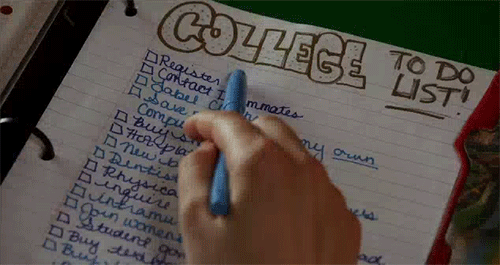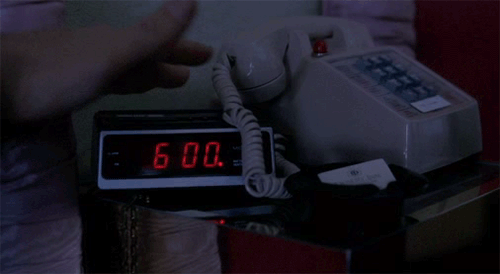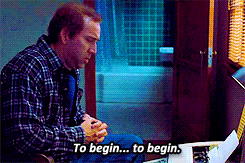We all know that feeling: that panicky, there’s-no-way-I’ll-make-it feeling that hits right around this time of the year. We’re at the back-end of the semester, and staring at a mountain of final assignments. Oh, and that light at the end of the tunnel? Yeah, that’s finals week, and it’s not making anyone feel any better. But the silver lining is there’s still hope for all of our GPAs.
1. Extra-credit projects

It never hurts to ask, especially since professors usually appreciate students who go out of their way to see how they can do better in the class. Explain your situation humbly and see if there are any bonus assignments you could do to maximize some extra-credit points. Every point helps.
2. Hit it off with your professor

Professors, for the most part, genuinely want to see you succeed. To give your GPA a final boost this semester, make the most of their office hours. Ask them the questions you don’t understand. Think about your paper’s thesis far enough in advance that you can talk to them about it and get their opinion (i.e. not at 3 a.m. the night before).
3. Turn off the tech

I once had a professor who made us pile all of our phones on a table when we first got into class, and had us take notes old-school using actual pen and paper instead of our laptops. At first, it felt really weird. I could feel my fingers twitching for my phone. The three-hour night class just dragged by without being able to surreptitiously scroll through Twitter underneath the table. By the end of the semester, I was paying attention much more easily and retaining information without staring blankly at my notes before each exam. It’s not too late to put away the technology and pay attention the way they used to before smart phones were invented.
4. No more multi-tasking

My “studying” usually involves an open page of notes in front of me, an episode of Scandal playing on the TV, music in my headphones, and scrolling through Instagram every couple of minutes as a “break.” This generation is so used to multi-tasking that we often don’t even notice we’re doing it. To really boost that GPA with some last-minute A’s, block everything out and focus on just studying or reading intensively for a block of time. After that, you can reward yourself however you want. I guarantee you’ll retain the information better and cut your study sessions in half with double the productivity.
5. Tutoring

Tutoring might not sound fun, but if you’re struggling in any of your classes, it’s worth the extra effort to pull up your grades. Finals might be fast approaching, but they’re not here yet. It’s not too late to find a tutor, especially if your school provides free help.
6. Bring coffee into class

This one’s pretty self-explanatory – to get that GPA up, you need to be awake enough to know what’s going on. Pump those espresso shots and minimize any zoning out or zombie brain in class.
7. Make new friends

Study groups are a great way to absorb a lot more information before exams and ask any questions you might not understand. Making friends in your classes will also help you to be even more comfortable in class and rack up any extra participation points.
8. Think about what’s at stake

It’s really all a mind game. A big part of doing well in school is having some kind of end goal to give you motivation and push you to work hard. Think about why you really need a great GPA this semester—whether it’s to keep your scholarship, secure a good internship, get into your dream grad school or impress your parents. Whatever your motivation, find one that’s important to you and stick to it.
9. To-do lists, and lots of them

Make a list of all the things you need to do, and organize them by time priority. I know I’m not the only one who’s been up until 4 a.m. working on a paper due Friday, when I should have definitely been finishing a project due the next morning instead.
10. Effective (realistic) time management

Emphasis on the realistic part. I’m all about making mini schedules for my day, but I can never stick to them because they’re so unrealistic. Like, work-for-10-hours-straight-and-skip-meals unrealistic. Manage your time wisely, but plan time for food and people in there too. Otherwise you’ll end up like me and throw away your awesome organized schedule within 30 minutes.
11. Get your ass to class

Sleeping in is more tempting than going to class any day of the year. But if your ass ain’t in class, that GPA is dropping straight to the floor. Leave your alarm on the other side of the room, get your roommate to wake you up in an annoying way, drink a lot of water the night before so you’re forced to get up – whatever gets you going in the morning, make it happen.
12. Find someone who’s already taken the class

This is a good idea to do earlier in the semester too, but it’s never too late to get a little extra help if you’re struggling. Someone who’s already been through the class(es) can tell you what the most important information is and the best ways to study for this particular professor’s exams.
13. Get creative

There are a lot of resources and apps out there just waiting to help the typical college procrastinator. Apps like Freedom block the Internet on your computer for a certain amount of hours, eliminating the temptation to surf the web. Other apps like Rescue Time track your Internet usage and break down how many hours you’re spending on “time wasting” websites like Facebook, and how much time you’re actually spending productively (i.e. on research sites).
14. Try to teach/explain the material to someone else

According to many psychology researchers, we tend to remember things with up to a 90 percent retention rate when we teach them to someone else. It’ll help you to get those extra points on any last exams or your finals, and it will make you feel more confident in your grasp of the knowledge too.
15. Check the withdrawal dates

Sometimes, we have to know when to call it quits. I know someone who withdrew from a class at the tail-end of the semester because he knew he was going to end up with a B and didn’t want to ruin his straight-A record. That might seem a little (a lot) drastic to most, but if you just know you’re going to fail a class and kill your GPA, withdrawing might be an option to consider.
16. Mind maps

One of the helpful study tools a friend told me about this semester was mind maps. They look similar to spider diagrams, and are a great way of organizing information and pulling your notes together in cohesive chunks. Not only will they help you to remember the material better for any last-minute cram sessions before finals, grouping the information together will make it easier to understand.
17. Know when to settle

If all else fails, you can just remind yourself that C’s get degrees, baby. C’s get degrees. At the end of the day, your sanity is more important than a grade on your transcript. If you’re a creative writing major finally taking your stats gen ed, you probably knew going into the class that it wasn’t going to end pretty. It’s more important to do your best than to do well.
18. Head to the gym

I’m going to bet that for most people, hitting the gym and hitting the books are completely separate activities. Exercise, however, is a proven way to lower stress levels and improve memory, essentially kicking your brain into high gear. Even just a 30 minute workout, whether it’s a jog around campus or a hardcore dance party, can help your problem solving and decision making.
19. Write right

Writing is a universal skill that you’ll use in practically every class and need to know how to do well, whatever your career path. Kill it on your papers by outlining ahead of time, clearly defining your thesis and taking note of the specific requirements each prof has for papers in their class. If you really want to improve your writing, plan for enough time to write a rough draft and then look it over the next day to catch any mistakes. Having a friend or classmate edit your paper will work wonders as well.
20. Cheat

Just kidding. Cheating is never a good idea.



















